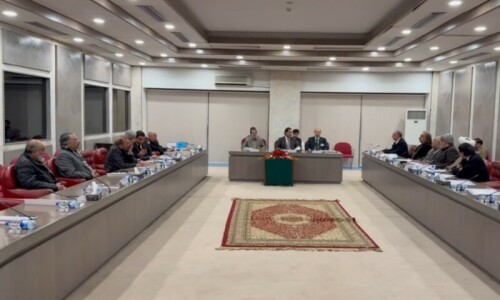ISLAMABAD: The British high commissioner, accompanying the head of a tobacco company on his visit to the finance ministry to have the latest tobacco regulation reversed, drew widespread criticism from various circles.
A British nongovernmental organisation, in a letter to British Diplomatic Service and the health ministry, lambasted the high commissioner for lobbying for the tobacco industry and demanded a public apology from the UK government.
TheNetwork for Consumer Protection Executive Coordinator Nadeem Iqbal told Dawn that High Commissioner Philip Burton and a British American Tobacco (BAT) delegation met Finance Minister Ishaq Dar on March 13 to request him to use his influence to reverse the latest tobacco regulation. The meeting was also attended by National Health Services (NHS) Minister Saira Afzal Tarrar and Director General Health, he said.
In response to this visit, Action on Smoking and Health (ASH), an anti-tobacco pressure group, wrote a letter to the British Diplomatic Services and Pakistan’s National Health Services (NHS) Ministry heavily criticising the high commissioner’s actions.
ASH Chief Executive Deborah Arnott writes in the letter, available with Dawn, that the UK as signatory to the World Health Organisation’s Framework Convention on Tobacco Control (FCTC) would be introducing plain cigarette packs from May 2016.
British pressure group calls his actions “appalling”
She wrote that while the UK’s decision to introduce plain cigarette packs has been welcomed internationally, the high commissioner is busy lobbying for the Pakistani government to reverse its decision to introduce packs with larger pictorial warnings.
Mr Burton’s actions, she writes, are “appalling”.
The regulation, announced on February 11, will increase the size of pictorial warnings on cigarette packs from covering 40 to 85 per cent of a pack, from May 2016. Since the announcement, the tobacco industry has been making efforts to have the decision reversed.
“We think it indefensible that the high commissioner should have participated in tobacco industry’s lobbying to prevent Pakistan putting in place measures that the UK has already implemented,” the letter further states.
The letter also notes that the British government is introducing plain packaging in its own country but has different health policies for other countries, exposing the belief that other nations do not deserve the same level of protection as British citizens.
Ms Arnott concludes the letter by demanding the UK government to publicly apologise for the actions of its high commissioner. She also urged the UK government to ask all ambassadors and high commissioners to clarify to their host countries that the UK is a supporter of the WHO FCTC and they are willing to provide technical assistance in the convention’s implementation in the host countries.
Nadeem Iqbal, who has been fighting for stricter regulations against the tobacco industry, told Dawn that during the meeting the Director General Health, Ishaq Dar and Ms Tarrar sat on one side of the table while the British High Commissioner sat next to the British American Tobacco head. “This is highly unfortunate,” he said.
“In Pakistan a large percentage of the population is below the age of 22 and we have to ensure that those 100 million children do not start smoking. Moreover, new pictorial warnings have improved Pakistan’s image in the world and we should not allow this to be reversed,” he said.
A British High Commission spokesperson, in a written statement, said the high commissioner has not lobbied with the government of Pakistan regarding regulations against the tobacco industry.
“The high commissioner continues to encourage implementation of the WHO Framework Convention on Tobacco Control globally,” he wrote.
Published in Dawn, March 31st, 2015
On a mobile phone? Get the Dawn Mobile App: Apple Store | Google Play















































Dear visitor, the comments section is undergoing an overhaul and will return soon.